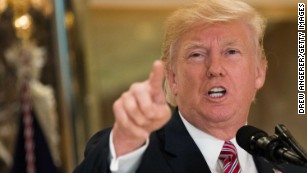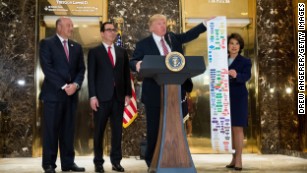
The CEOs who quit Trump's business councils 03:11
Story highlights
- Trump dissolved business advisory panels after exodus of CEOs who said they were troubled by his handling of Charlottesville
- Mark Bauerlein: Liberals have made it impossible to sit at table with someone with whom you disagree. This hurts democracy
Mark Bauerlein is a professor of English at Emory University, senior editor of the journal "First Things" and author of "The Dumbest Generation: How the Digital Age Stupefies Young Americans and Jeopardizes Our Future; Or, Don't Trust Anyone Under 30." The opinions expressed in this commentary are his own.
(CNN)It's
hard to imagine that mob violence over a Confederate statue in
Charlottesville, Virginia, has any bearing on business groups organized
by the White House, but the President's two CEO panels ended up toppled
in the chaos of the past week anyway. There is a lesson here, but it may
be different from what you think.
After
three, then four, then six, and finally eight business and union
leaders resigned in rapid succession from the Manufacturing Council and
the Strategic and Public Policy Forum, President Donald Trump dissolved
the panels entirely.
This
is where we are. Nothing is immune to partisanship; everything is
political; you can't disagree with others and remain at the table
together.
The members
resigned because of something that had no relation to corporations and
the workforce. They believed that Trump didn't denounce white
supremacists quickly and unambiguously enough -- and thus, he was
complicit in American racism, a view the President seemed to bolster
with comments Tuesday that walked back his more moderate comments on
Charlottesville from two days earlier. The CEOs took their cue from the
media.
A column in USA Today maintained that President Trump's initial tweets "provided aid and comfort to the Nazis and white supremacists." The headline
at Mother Jones says it all: "What Does It Take for Conservatives to
Acknowledge that Donald Trump Is Racist?" On the right, too, we find
voices joining the chorus. Commentary's John Podhoretz claimed that
Trump's instinct is: "Do not attack the white supremacists."
Against
this background came the statements of the CEOs who fled Trump's
council. Scott Paul, head of the Alliance for American Manufacturing,
stated, "I'm resigning from the Manufacturing Jobs Initiative because
it's the right thing for me to do." Kenneth Frazier said in a statement,
"As CEO of Merck and as a matter of personal conscience, I feel a
responsibility to take a stand against intolerance and extremism."
Others in the groups expressed similar opinions.
While
they sound reasonable and benign, each resignation has an implicit
message: Trump is not inclusive and tolerant; he is regressive. After
all, how is resigning from the council taking "a stand against
intolerance and extremism" unless Trump is intolerant and extreme?
The
tacit equation is this: Trump equals the KKK. And according to the
resigning leaders, avoiding him, rejecting him, distancing one's self,
are all "the right thing to do" -- not arguing with him, urging him to
take a different course, or demanding that he choose sides between white
supremacists and hostile groups on the left.
In
truth, the President's only crime was that he spoke too generally about
the violence in Charlottesville, with his remarks that "many sides"
were responsible. This comment, which he initially made on Saturday, and
reiterated on Tuesday, was one that the CEOs deemed punishable. Trump
wouldn't acknowledge the "white" factor, and so the resigners decided to
join the countless Americans who seek to shun and shame him.
If
they wished only to criticize the President's response, they could
easily have done so while remaining members of the newly formed panels.
They could have even used their position to start a dialog with Trump
about the issue: "Mr. President, I join you in advancing the cause of US
workers, but your take on what's going on in Virginia and elsewhere is
backward." That is, in fact, what Walmart's CEO had done, as well as had the head of Blackstone.
But
in the climate liberals have created, especially where race and sex are
concerned, criticism isn't enough, no matter how stern and slashing.
The villain must be isolated. Interaction of any kind is the same as
endorsement. Even sitting down to debate with the President at a meeting
would violate their moral code.
It's
the kind of righteous distaste I've seen from liberal academics when
they've found themselves at professional gatherings stuck in the
presence of a conservative. Contentious, but polite conversation is
asking too much of them.
In
other words, the resignations are another version of the social ritual
of exclusion. They are passive-aggressive in that they explicitly
indicate that the CEOS are separating themselves from the
administration, but implicitly they are an exile of Trump from the
society of well-meaning, open-minded souls.
We
are polarized as never before, but while in the past we understood the
two camps in political terms, left and right, liberal and conservative,
increasingly we see it cast in personal terms, the enlightened vs. the
ignorant, respectable vs. deplorable, tolerant vs. bigoted.
Given this division, how will we ever reconcile with one another in a shared democracy?



No comments:
Post a Comment